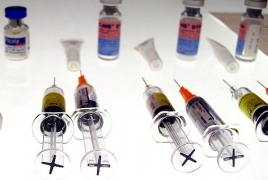
For the first time in a half a century, life expectancy in the United States declined for the second year in a row — and America’s opioid epidemic is to blame. A child born in 2016 is expected to live 78.6 years, down from 78.7 years in 2015 and 78.9 in 2014, according to statistics released by the US Centers for Disease Control and Prevention.
"Two years in a row is quite shocking," Robert Anderson, chief of the mortality statistics branch at the National Center for Health Statistics, told AFP. "The key factor in all this is the increase in drug overdose deaths."
Yet amid the overdose epidemic, another opioid vaccine has shown promising — albeit early — results in the laboratory, Seeker reports.
Scientists at the US Military HIV Research Program at the Walter Reed Army Institute of Research (WRAIR) recently developed a vaccine that blocks the opioids in heroin from reaching the brain in mice and rats, offering a potential breakthrough in treating opioid addiction.
When injected, the heroine vaccine releases antibodies into the blood that prohibit the drug from breaking through the blood-brain barrier. This means that even if a heroin addict shoots up, they won’t experience a high. The vaccine includes a potent adjuvant, a substance that boosts the body’s immune response to a toxin, called the Army Liposome Formulation, also developed by researchers at WRAIR.
“All vaccines to substances of abuse function through causing the body to make antibodies that bind the drug of interest and prevent it from entering the brain,” Dr. Gary Matyas, chief of adjuvants and formulations for the US Military Research Program and one of the study authors, told Seeker.
While Matyas and his team have not directly tested their vaccine against vaccines from other research facilities, they have tested it against an older vaccine developed by WRAIR and found that the new one is more effective and very stable. “[Its stability] should increase its shelf-life and keep it from degrading during vaccine manufacturing and storage,” Matyas said.

